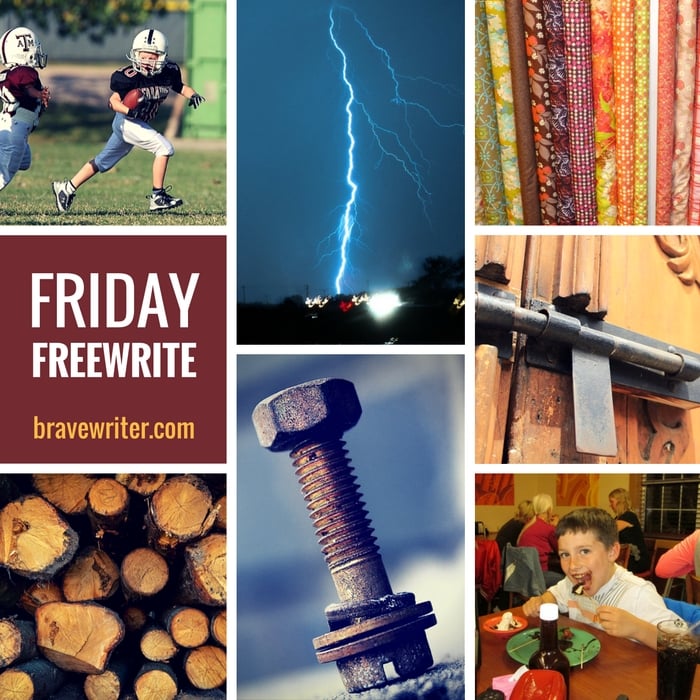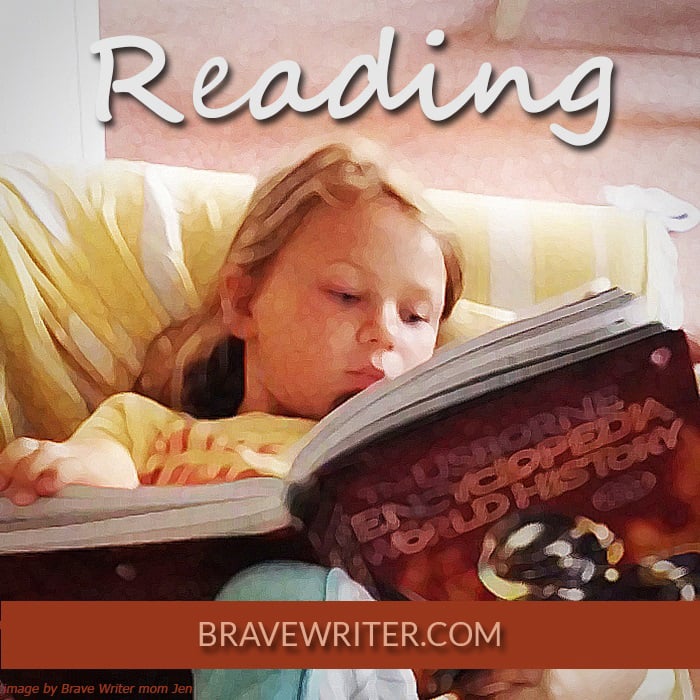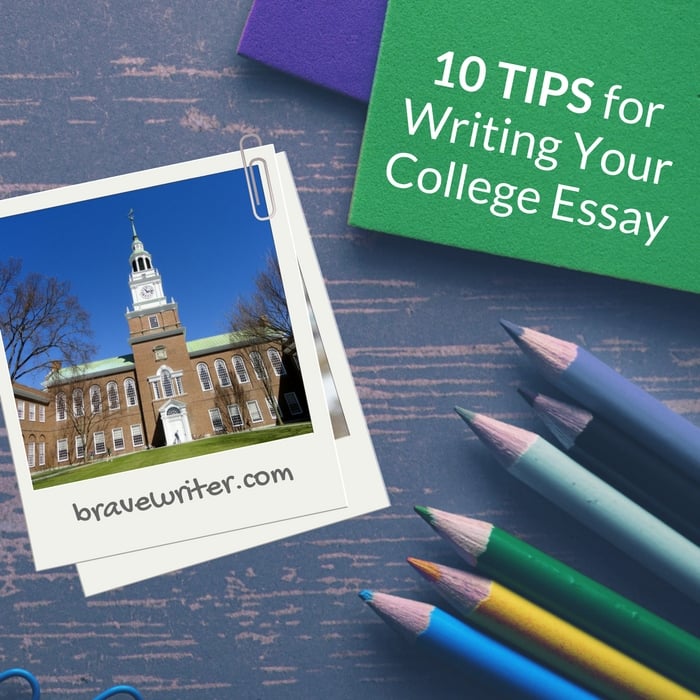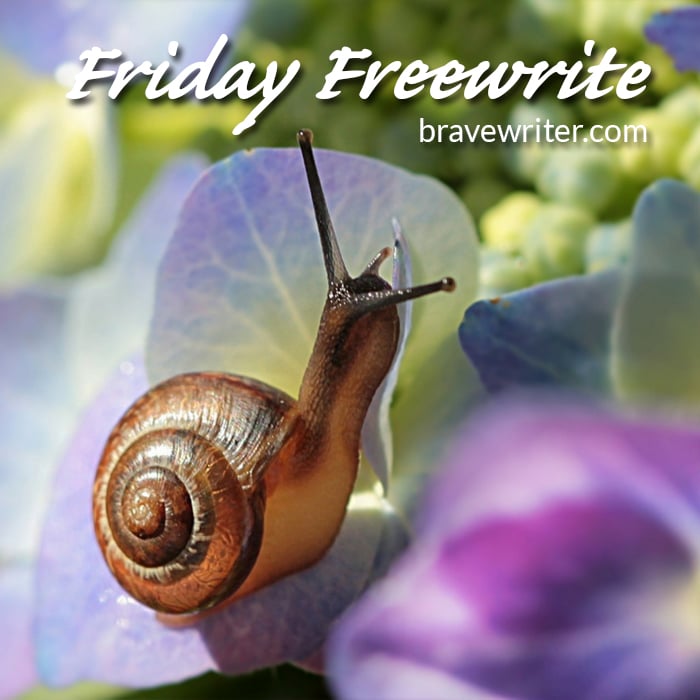
There are many definitions for “bolt.” See how many ways you can use the word in a story. Go!
New to freewriting? Check out our online guide.

There are many definitions for “bolt.” See how many ways you can use the word in a story. Go!
New to freewriting? Check out our online guide.
Posted in Friday Freewrite | Comments Off on Friday Freewrite: Bolt

Reading should not be presented to children as a chore or duty.
It should be offered to them as a precious gift.
—Kate DiCamillo
In the recorded broadcast below we look at reading in all its facets:
Want more? Enjoy these Brave Writer blog posts:
Posted in Periscopes, Reading, Video of Julie | Comments Off on Stuff Every Parent Needs to Know about Reading
One of our students in our The Writer’s Jungle Online class (taught by the fabulous Sarah Holden) and had her final piece published on a swimming website! Congratulations, McKenna! Here’s the intro to her essay:
by McKenna Rooney
It’s Regionals, the last big meet before State. Three grueling days of racing. It’s Friday night, day one.
The normally packed Rec Plex, (one of the biggest aquatic sports complexes in all of America) is pretty empty – there must be very few crazy people like me who want to start their weekend off with a distance race.
I’m waiting to swim the 500 free – 20 long laps of music going through my head over and over again. Ugh.
As I get up to approach the blocks my coach, Scott, said to me “I want you to break seven minutes.”
I gulped and said “Okay? Sure?” My seed time was 7.11.96, meaning I had to drop almost 12 seconds off my best time to achieve this new goal. I nod my head, but in my mind I’m thinking, “You’re insane!”…Read the rest on Swim Swam.
Posted in Online Classes, Students | Comments Off on Student Spotlight: McKenna

By Nancy Graham
Your college application essay is a way for people you’ve never met to get some sense of who you are—what drives your intellect, what matters to you, what you love most in this world, what you’re doing when you are most engaged and most at ease, and what it will be like to study and socialize with you on campus. The essay that will fit the bill is the one that shares an experience that feels important to you.
Reading other essays will trigger ideas about your own. You’ll get a feel for what kind of story can be told in a few hundred words and how some writers have made the form their own. My favorite site for sample essays is Johns Hopkins University’s “Essays That Worked.” Of course, there’s no need to confine yourself to college essays for inspiration! Check out The Best American Essays series (affiliate link—thank you for supporting Brave Writer!) or spend a weekend with James Baldwin, Joan Didion, Zadie Smith, Annie Dillard, Ralph Waldo Emerson, or your favorite essayist.
Before you choose a prompt, try making a few lists.
Some useful lists:
Or make lists in answer to these questions:
Once you’re ready to work with prompts, use them to make more lists. Let your list making lead you into a story you want to tell.
Once you have a sense of what you’d like to write about, freewrite in 10- to 20-minute bursts. Think of your memories as short stories that build.
These can be subtle rather than big and dramatic, but they’re important because they show how you changed: how you succeeded in solving a problem, how you matured, how you transformed a difficulty into a learning experience. This will dictate the shape of your essay.
Luxuriate in the freewriting phase. Give yourself a week or two of successive freewriting to find your strongest material. The furthest thing from your mind during this phase should be your word count. You may generate thousands of words to find the nugget that will be your 650-word essay.
Details, details, details! Details is the word I type most often in our College Admission Essay class. Sensory details allow the reader to picture you in your life. The reader can’t do that if you only share abstract ideas. As you freewrite, connect to your five physical senses and ask yourself what sights, sounds, textures, tastes, and smells you can remember. Be as particular as you can—“I worked hard” is a start. More specific: “I rose in the dark and ran ten miles by sun-up.”
If you choose a story with meaning for you, and you relate it with sensory details, you will be on the road to sharing some aspect of yourself that will have relevance for the admissions committee.
Some elements that shine in successful essays:
After you’ve done loads of freewriting and expanding (adding more sensory details and bits of dialogue), see if you can boil your topic down to one sentence. How about one word? Let it guide you as you continue drafting.
As you draft and revise, if you need a boost, take along a notebook and pen and pour your heart out to someone else about why your topic matters to you. Reminisce, tell stories from your life related to your topic. When you go back to drafting, think of your essay as a gift to yourself, a capstone for the early part of your life. Make it count for you.
Your opening should pull the reader in by arousing our curiosity or cutting in on action that will sweep us along. A good opener surprises or provokes.
Your conclusion should be just that—your conclusion. It couldn’t conclude anyone else’s essay. It leaves the reader with your sense of possibility and expansion, or the feeling that a shift has taken place in you. Resist the temptation to generalize in your conclusion. Anyone can write, “Whatever happens I never give up, because being persistent is the key to making my dreams come true.” Stay specific, even while placing your experiences in a wider context. Release your readers with a clear picture of you in their minds.
Let your essay sit a few days and read it again before uploading: you may catch something new.
Posted in Help for High School | Comments Off on Ten Tips for Writing Your College Essay

Pick an action that doesn’t take long, like ringing a doorbell or sneezing. Now describe it in s-l-o-w motion at one second (or less!) intervals. Drag it out as long as possible!
For example:
My nose twitched. I crinkled it while slightly opening my mouth. I looked for a nearby tissue. There was none. I raised my arm and crooked my elbow in front of my face. My eyes closed. My head tilted back. My mouth opened wider. Wider. Wider. There was a pause. “Achoo!!”
New to freewriting? Check out our online guide.
Posted in Friday Freewrite | Comments Off on Friday Freewrite: Snail’s Pace

I’m a homeschooling alum -17 years, five kids. Now I run Brave Writer, the online writing and language arts program for families. More >>
IMPORTANT: Please read our Privacy Policy.















